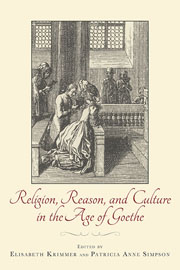Book contents
- Frontmatter
- Contents
- Acknowledgments
- Introduction
- I Wieland and Herder
- II Schiller and Goethe
- 3 Clever Priests and the Missions of Moses and Schiller: From Monotheism to the Aesthetic Civilization of the Individual
- 4 “Then Say What Your Religion Is”: Goethe, Religion, and Faust
- 5 Classicism and Secular Humanism: The Sanctification of Die Zauberflöte in Goethe's “Novelle”
- III Kleist and Hölderlin
- IV Leibniz, Spinoza, and Their Legacy
- Notes on the Contributors
- Index
5 - Classicism and Secular Humanism: The Sanctification of Die Zauberflöte in Goethe's “Novelle”
from II - Schiller and Goethe
Published online by Cambridge University Press: 05 December 2013
- Frontmatter
- Contents
- Acknowledgments
- Introduction
- I Wieland and Herder
- II Schiller and Goethe
- 3 Clever Priests and the Missions of Moses and Schiller: From Monotheism to the Aesthetic Civilization of the Individual
- 4 “Then Say What Your Religion Is”: Goethe, Religion, and Faust
- 5 Classicism and Secular Humanism: The Sanctification of Die Zauberflöte in Goethe's “Novelle”
- III Kleist and Hölderlin
- IV Leibniz, Spinoza, and Their Legacy
- Notes on the Contributors
- Index
Summary
“Classicism” and “secular humanism” seems an obvious combination: Goethe, the great pagan, substituted a generalized ethic of humanity (taken in its broadest possible religio-ethical and aesthetic sense) as the social glue that replaced the function of sectarian religion in post-Enlightenment secularized Europe. He offered a heightened version of Enlightenment culture and reason that obviated the need for religion. Through World War I his name alone evoked an entire system of ethics, aesthetics, and even epistemology among writers as disparate as Adalbert Stifter, Wilhelm Raabe, Theodor Fontane, Hugo von Hofmannsthal; and scholars such as the psychoanalytic generation, Hannah Arendt, Norbert Elias, Oswald Spengler; and philosophers such as Benedetto Croce and José Ortega y Gasset. My subtitle reveals the underlying schism— “sanctification” is a religious term; Die Zauberflöte (The Magic Flute), a hangover of the particularly secular and disrespectful Enlightenment associated with the French Revolution; and the “Novelle,” a charming, respectable, Biedermeier idyll. The Goethe cult that substituted German classicism for religion was, for better or worse, not interested in the Goethe of the 1820s, except for his conversations with Eckermann; “the late Goethe,” or, as I would have it, “the Biedermeier Goethe,” offers, however, a more mature, richer classicism, indeed a sanctified classicism.
- Type
- Chapter
- Information
- Religion, Reason, and Culture in the Age of Goethe , pp. 120 - 138Publisher: Boydell & BrewerPrint publication year: 2013



